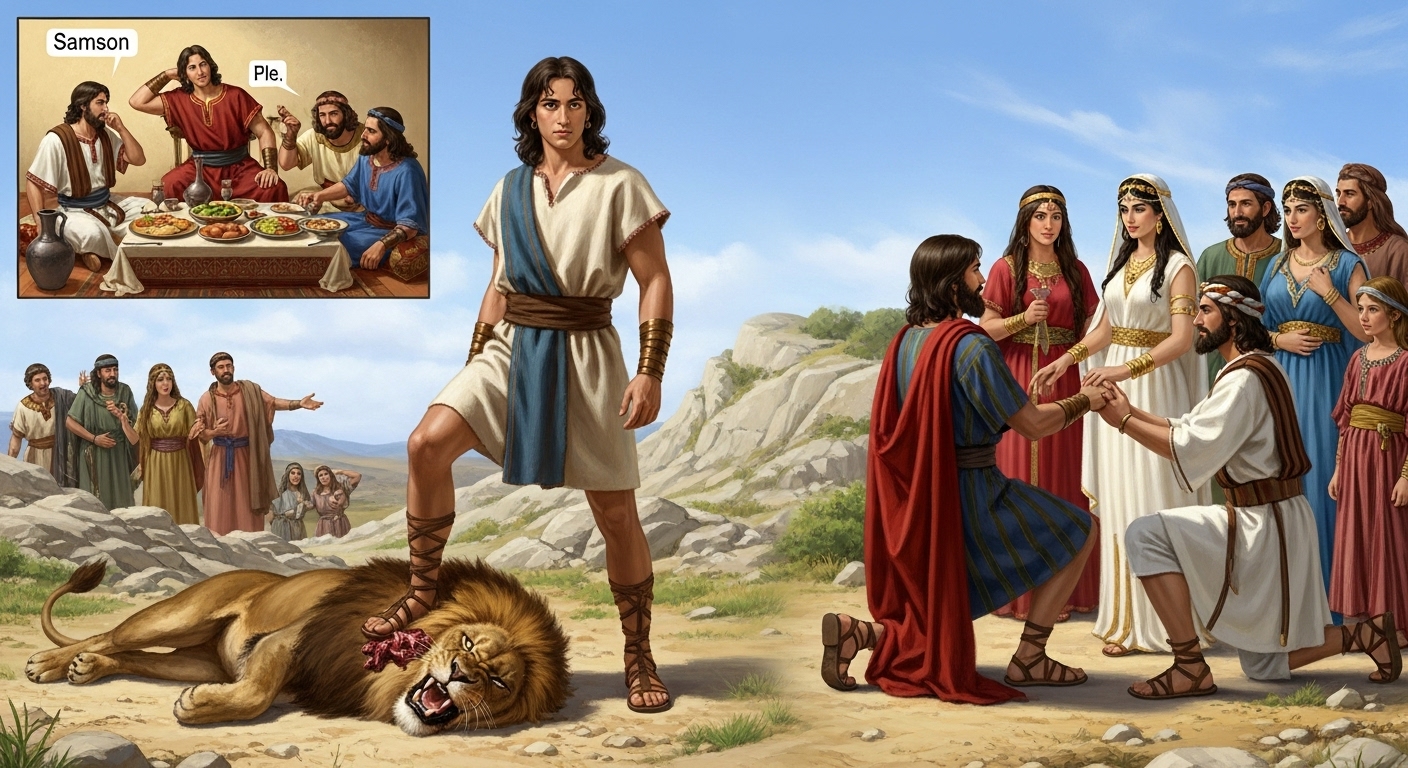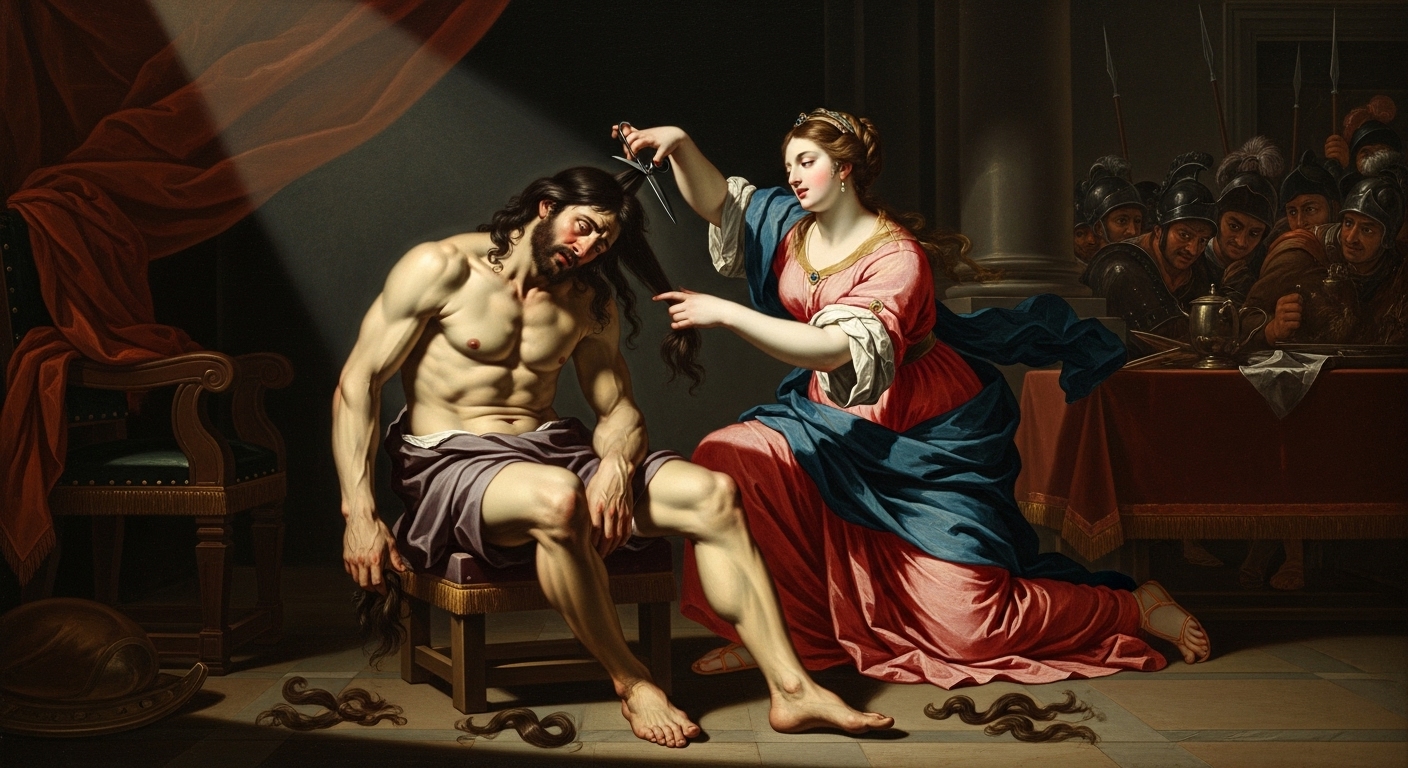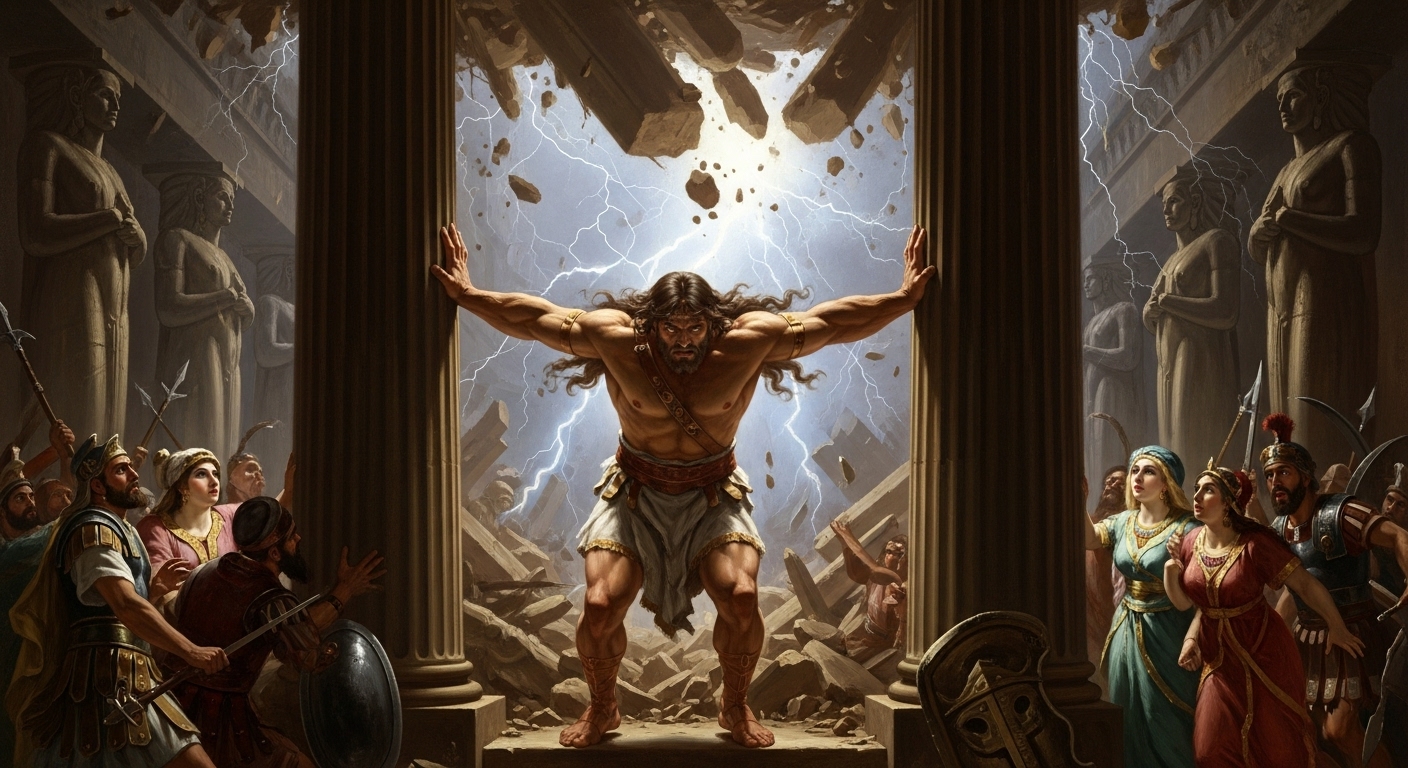Samson’s Strength – A Gift From God To Deliver Israel
You’re about to walk through one of the most dramatic and debated stories in the Old Testament: the life of Samson, told in Judges 13–16. This is a story of supernatural strength, personal weakness, and God’s surprising choice of instruments to change history. Throughout this article, you’ll see how Samson judged Israel, how God’s Spirit empowered him, and how his life raises questions about vocation, obedience, and redemption. As you read, you’ll find verse links to Bible Gateway so you can check the text directly and reflect on the original passages.
Historical context: the time when Samson judged Israel
You need to understand the setting to appreciate Samson’s role. The book of Judges covers a period when Israel was a loose confederation of tribes without centralized leadership, and the recurring pattern is failure, oppression, crying out, and deliverance. The text explicitly notes that the Israelites did evil and were oppressed by the Philistines, which sets the stage for Samson’s appearance Judges 13:1. When Samson judged Israel, the nation was fragmented and under the sway of a relentless enemy—a context that makes his story both necessary and deeply tragic.
The announcement of Samson’s birth: a divine plan
You’ll find the narrative of Samson’s birth in Judges 13, where an angel announces his coming to an otherwise barren woman. The message is striking: Samson is to be a Nazirite from birth, set apart for God’s service. This divine announcement shows that Samson’s vocation was intentional and tied to Israel’s deliverance Judges 13:3–5. When Samson judged Israel later, he did so because God had given him a specific role, beginning before his birth, underscoring the idea that his strength was a gift, not merely a genetic accident.
Nazirite vow: what it meant for Samson
Understanding the Nazirite vow helps you see why Samson’s hair mattered. Nazirites took vows to abstain from wine, avoid ritual impurity by contact with corpses, and not cut their hair, as a sign of being set apart for God. The angel’s instructions to Samson’s mother outline this commitment Judges 13:7. You’ll notice that Samson’s uncut hair becomes the visible symbol of his consecration and the physical channel through which God’s power frequently flows. When Samson judged Israel, his Nazirite status made him distinct and, at times, isolated—both blessings and burdens.
Early signs of strength: the Spirit begins to move
From the start, the Spirit of the Lord is linked to Samson’s strength. After he’s named and raised, the biblical narrator tells you that “the Spirit of the Lord began to stir him” Judges 13:24–25. This phrasing emphasizes that Samson’s extraordinary abilities are not merely personal talents but manifestations of divine action. You’ll find repeated mentions of the Spirit empowering Samson at critical moments, and each time the text underscores that his feats were driven by God’s presence as he judged Israel.

Samson’s first exploits: lion, riddle, and marriage
You’ll quickly see Samson’s life unfold in dramatic episodes. He famously tears a lion apart with his bare hands Judges 14:5–6, solves a riddle that enrages his Philistine companions Judges 14:12–14, and takes the consequential step of marrying a Philistine woman Judges 14:1–3. These early events show you how Samson’s personal choices are entangled with his public calling. His interactions with the Philistines, while driven by desire and personal conflict, push the larger story of deliverance forward. When Samson judged Israel, those private episodes had national consequences.
Strength is a double-edged sword
You need to notice that Samson’s gift is double-edged. On the one hand, his strength delivers Israel from Philistine oppression in vivid, violent ways. On the other hand, his impulsive desires and poor choices undercut his calling. After the riddle incident, Samson’s relationship with the Philistines escalates into cycles of revenge and violence. You’ll see this pattern in his burning of Philistine fields and the brutal slaughter he leads Judges 15:1–8. While his feats are heroic in the immediate sense, they don’t build lasting peace or spiritual renewal for Israel, which complicates the notion of him as an ideal deliverer when Samson judged Israel.
The Spirit and moments of weakness
Samson’s narrative keeps returning to the interplay between divine empowerment and human failure. When the Spirit comes upon him, Samson performs extraordinary deeds, such as when he uses the jawbone of a donkey to kill a thousand men Judges 15:14–15. Yet these moments are interspersed with moral lapses that lead to his downfall. You’ll find the most famous example in his relationship with Delilah, where repeated manipulations lead to his capture Judges 16:4–17. That juxtaposition forces you to wrestle with the paradox: God’s power works through flawed people, and deliverance can come through messy, even scandalous, human lives.

Delilah and the loss of strength
Delilah is central to the drama of Samson’s final days. You’ll read how the Philistines bribe her to discover the secret of Samson’s strength, and she repeatedly entices him until he reveals that his strength lies in his uncut hair Judges 16:18. When she has his hair cut, the Spirit departs from him, and he’s weakened and captured Judges 16:19–20. This tragic moment shows the vulnerability inherent in Samson’s particular charisma: his physical sign of consecration (his hair) is both the emblem of his gift and the point of his greatest exposure. When Samson judged Israel, his defeat became an object lesson in how intimacy and betrayal can dismantle God-given roles.
Captivity and humiliation: a low point for Israel and Samson
You can’t miss the humiliation Samson endures after Delilah’s betrayal. He is blinded, bound, and forced to grind grain in a Philistine prison—an image that powerfully symbolizes Israel’s oppression and Samson’s personal degradation Judges 16:21. During this period, you see the stakes of leadership failure: not only is Samson reduced, but Israel’s chance at freedom seems even more distant. Yet the narrative doesn’t end there; it sets up a final turn where Samson’s theological and emotional resources are tested and where redemption, of a sort, becomes possible.
The final act: strength restored for one last deliverance
In a climactic scene, Samson prays and asks God to remember him and give him strength one final time, so he can avenge Israel upon the Philistines Judges 16:28. You’ll read that God answers his plea—the Spirit returns—and Samson pulls down the temple pillars, killing himself and thousands of Philistines in the process Judges 16:29–30. When Samson judged Israel in this final act, the result was both decisive and costly. His story closes with him doing what he was set apart to do, but at the price of his life. That tension between deliverance and sacrifice is central to how you interpret Samson’s role as a divinely appointed judge.
Reading Samson: hero, antihero, or tragic figure?
You’ll find that opinions vary about Samson’s status. Is he a hero because he defeats Israel’s enemies? Is he an antihero because of his moral failures? Or is he a tragic figure whose gifts were misused until God redeemed him at the end? The text itself is ambiguous and full of irony: the one chosen to deliver Israel behaves in ways that are often self-destructive. When Samson judged Israel, the narrative both praises and critiques him, which invites you to read his life as complex rather than one-dimensional. His story encourages you to hold competing truths together: God can use flawed people, and even flawed deliverers can be part of God’s redemptive work.
The Spirit of the Lord in Samson’s life
You need to pay attention to how the book repeatedly ties Samson’s ability to the Spirit of the Lord. Each decisive action is accompanied by the Spirit’s presence, and each loss of power follows the Spirit’s departure. This pattern is theological: God’s power is not automatic or mechanical; it is relational and contingent on God’s will. The Spirit empowers Samson in moments of personal calling and national necessity, which shows you that deliverance is ultimately God’s doing, even when it’s enacted through a single extraordinary person Judges 14:6.
Lessons about vocation and humility for you
Samson’s story has practical lessons you can apply. First, being chosen doesn’t exempt you from temptation or poor judgment. Samson’s life shows how vocational gifts can be compromised by personal weakness. Second, you learn that God’s empowerment often looks different what you expect: it can arrive in private struggles, public conflicts, and even apparent failures. When Samson judged Israel, his vocation required both divine power and human responsibility. That combination nudges you to couple your gifts with discipline, accountability, and humility.
The problem of violence: wrestling with the text
You may struggle with the violence in Samson’s story. The narrative is raw and includes acts of brutality that make many readers uncomfortable. You mustn’t gloss over that; instead, face it honestly. Judges present violence as part of Israel’s chaotic era and as a result of a people who repeatedly forsook God. Samson’s violent deeds are part of that moral mess, and the text neither wholly endorses them nor sanitizes them. When Samson judged Israel, the deliverance came through violent means, which raises larger ethical questions about means and ends that you have to reckon with.
Samson and Israel’s cycle of sin and deliverance
Remember that you’re seeing a pattern repeated throughout Judges: Israel sins, becomes oppressed, cries out, and God raises a judge. Samson’s story fits that cycle perfectly, showing you how national sin and personal sin are interconnected. His life is a microcosm of the book’s wider theology. When Samson judged Israel, his life both perpetuated and temporarily reversed Israel’s downward spiral. You’ll see that deliverance in Judges often restores a precarious peace rather than achieving lasting reform.
Literary features: how the story is told
Pay attention to the literary art in Judges 13–16. The narrative is full of irony, repetition, and carefully structured scenes. The writer sets up motifs—hair, the Spirit, betrayal—that recur and culminate in the temple collapse. The story uses striking images to make theological points, so when you read it slowly and with attention to structure, you’ll notice the craft behind the arc from promise to fulfillment. This helps you appreciate that the biblical author intends you to wrestle with Samson’s contradictions rather than offering a simple moral.
Interpretations across traditions
You’ll find a wide range of interpretations of Samson across Jewish, Christian, and secular commentaries. Some emphasize him as a nationalistic hero, others as a cautionary tale about sexual immorality, and many theological readings focus on God’s sovereignty in choosing unlikely instruments. Modern scholarship sometimes highlights the story’s folkloric elements, while devotional readings tend to emphasize God’s faithfulness despite human failure. Whatever your interpretive approach, when Samson judged Israel, you’re prompted to think about how God’s purposes are worked out in complicated human histories.
Samson in art and culture
Samson’s dramatic life has inspired countless works of art, music, and literature. You’ll see him in paintings of Delilah, operas that dramatize his final cry, and films that adapt his story with varying fidelity. Cultural treatments often focus on the spectacle—strength, seduction, and collapse—because it’s so visually and emotionally compelling. When Samson judged Israel, his story didn’t stay in ancient texts; it has reverberated through millennia of artistic interpretation, showing you how powerful narratives travel and transform across time.
Practical spiritual reflections for you
Practical reflections should help you move from story to life. First, consider how your gifts might be both empowering and distracting; commitment and community can moderate that risk. Second, reflect on where you might be susceptible to temptation and who can hold you accountable. Third, remember that God’s power can restore at unexpected moments; Samson’s last prayer and the Spirit’s return show that restoration can come even after severe failure Judges 16:28–30. When Samson judged Israel, his end reminds you that repentance and God’s mercy can intersect even in dire circumstances.
How to read Samson honestly in a modern context
When you approach Samson’s story, read it with both historical sensitivity and present-day honesty. Avoid romanticizing his violence or excusing his moral lapses. Instead, let the complexity teach you about the tension between divine calling and human responsibility. Engage the primary text directly using reputable sources—like the links provided to Bible Gateway—so you’re not relying solely on secondary summaries. That careful reading helps you appreciate the theological depth of Judges and the sobering reality that God’s work often comes through imperfect people.
Concluding reflections: Samson’s gift and Israel’s hope
By now, you’ve seen how Samson’s story is a study in paradox: strength that depends on consecration, a savior who falls into weakness, and a final act that accomplishes deliverance at great cost. When Samson judged Israel, his life shows that God’s gifts are real and powerful, but they require faithfulness. Your takeaways might be mixed—admiration for the tremendous feats, sorrow for the moral decline, and hope in the final act of faith. The narrative invites you to hold these strands together and to reflect on how God works through messy human lives to bring about freedom.
Explore More
For further reading and encouragement, check out these posts:
👉 7 Bible Verses About Faith in Hard Times
👉 Job’s Faith: What We Can Learn From His Trials
👉 How To Trust God When Everything Falls Apart
👉 Why God Allows Suffering – A Biblical Perspective
👉 Faith Over Fear: How To Stand Strong In Uncertain Seasons
👉 How To Encourage Someone Struggling With Their Faith
👉 5 Prayers for Strength When You’re Feeling Weak

📘 Jesus and the Woman Caught in Adultery – Grace and Mercy Over Judgement
A powerful retelling of John 8:1-11. This book brings to life the depth of forgiveness, mercy, and God’s unwavering love.
👉 Check it now on Amazon 🛒💥
🔥 “Every great message deserves a home online.” 🌍💬🏡
Don’t let your calling stay hidden. Start a Christian blog or website using Hostinger — with 99.9% uptime, a free domain, and SSL, your voice can shine for God’s glory anytime, anywhere.
💥 Begin today. 🛒 Try it RISK-FREE! ✅
✝️ “Your body is God’s temple — care for it with purpose.” 💪💖🏛️
Renew your energy and restore balance naturally. Mitolyn helps support a healthy metabolism, giving you the vitality to live out God’s calling with strength and confidence.
🔥 Unlock Your Metabolic Power! ⚡Burn More Calories & Feel Great With Mitolyn. 💪
👉 Start Today. 🚀 Check Price Now. 🛒💰
💰 As a ClickBank & Amazon Affiliate, I earn from qualifying purchases.
📖 Acknowledgment: All Bible verses referenced in this article were accessed via Bible Gateway (or Bible Hub).
🚀 Want to explore more? 👉 Dive into our new post on Why Jesus? and experience the 🔥 life-changing truth of the Gospel!









